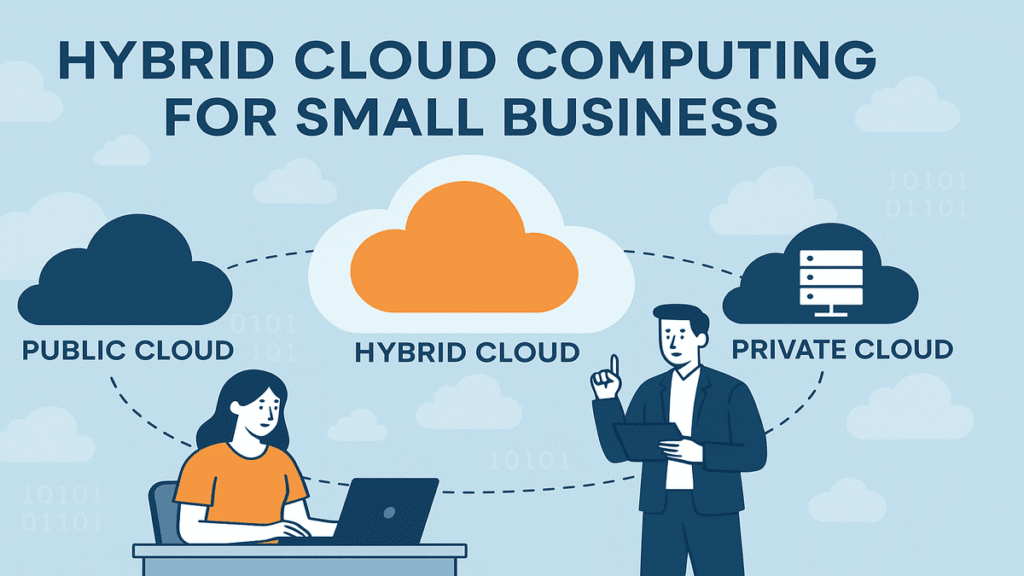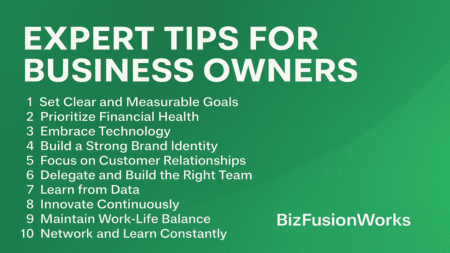In today’s fast-evolving digital landscape, small businesses are constantly seeking efficient, cost-effective, and secure technology solutions. One approach gaining momentum is hybrid cloud computing. While large corporations have used cloud technology for years, hybrid cloud computing now offers small businesses the same agility, flexibility, and control — without the hefty price tag.
This article explores what hybrid cloud computing is, how it benefits small businesses, and why it might be the best fit for your company.
What Is Hybrid Cloud Computing?
Hybrid cloud computing is a blend of public cloud, private cloud, and sometimes on-premises infrastructure. It allows businesses to move data and applications between environments as needed, offering greater flexibility and efficiency.
- Public Cloud: Managed by third-party providers (e.g., AWS, Microsoft Azure, Google Cloud).
- Private Cloud: Infrastructure used exclusively by one organization, often on-site or in a private data center.
- Hybrid Cloud: Combines both, enabling better control over critical data and flexible scalability.
Why Is Hybrid Cloud Ideal for Small Businesses?
Small businesses typically have limited IT budgets and staff. Hybrid cloud computing offers an adaptable solution that balances cost, performance, and security.
1. Cost Efficiency
Small businesses can store sensitive data on a private cloud while using the public cloud for less critical tasks. This reduces infrastructure investment and operational costs.
2. Flexibility & Scalability
Hybrid cloud allows small businesses to scale resources up or down based on demand, which is perfect for seasonal businesses or growing startups.
3. Enhanced Security
Sensitive information can remain on-premises or in a private cloud, while less sensitive data can be stored in a public cloud, balancing risk and security.
4. Business Continuity
Disaster recovery is easier with a hybrid cloud setup. If your on-site systems fail, your data remains safe and accessible from the cloud.
5. Faster Innovation
With access to cloud-based tools and services, businesses can test, develop, and deploy applications faster — without needing a large IT team.
Use Cases for Hybrid Cloud in Small Business
- E-Commerce Stores: Manage customer databases securely on a private server, while hosting the storefront and media on the public cloud for performance.
- Healthcare Practices: Store patient records privately while using cloud-based systems for appointment scheduling and general communication.
- Startups: Use cloud tools for rapid app development and testing, while keeping sensitive IP or business logic in a private environment.
Challenges to Consider
Although hybrid cloud offers several advantages, small businesses should also consider potential challenges:
- Complexity in Integration: Combining multiple environments requires proper configuration and oversight.
- Compliance Issues: For industries with strict data regulations, hybrid cloud must be carefully managed.
- IT Expertise: Setting up and maintaining a hybrid cloud may require third-party support or skilled staff.
How to Get Started with Hybrid Cloud
- Assess Your Needs: Identify which applications and data need to stay private and what can move to the cloud.
- Choose the Right Providers: Research public cloud services that integrate well with your private infrastructure.
- Develop a Migration Strategy: Work with IT experts or cloud consultants to create a detailed plan.
- Implement Gradually: Start small by moving non-critical workloads to the cloud and expand from there.
- Monitor & Optimize: Continuously evaluate performance and security, adjusting as necessary.
Future of Hybrid Cloud for Small Businesses
As technology advances, hybrid cloud solutions are becoming more user-friendly and affordable. With the growth of AI, IoT, and remote work, hybrid cloud computing will play an even bigger role in supporting modern business models.
Small businesses that embrace this technology today are positioning themselves for agility, innovation, and success in the future.
FAQs: Hybrid Cloud Computing for Small Business
Q1. Is hybrid cloud expensive for small businesses?
Not necessarily. Hybrid cloud helps reduce upfront infrastructure costs and allows pay-as-you-go pricing with public cloud services, making it affordable for small companies.
Q2. Can I run a hybrid cloud setup without a full IT team?
Yes. Many service providers offer managed services, which means they handle most of the technical setup and maintenance for you.
Q3. What kind of businesses benefit the most from hybrid cloud?
Any business that handles sensitive data or requires flexibility — such as healthcare providers, retailers, and tech startups — can benefit significantly.
Q4. How secure is hybrid cloud computing?
Hybrid cloud can be very secure if implemented correctly. Critical data stays in a controlled environment, while additional security protocols can protect cloud interactions.
Q5. How quickly can a small business implement a hybrid cloud solution?
With proper planning and support, a small business can begin hybrid cloud implementation within weeks, especially if starting with only a few applications or services.
Conclusion
Hybrid cloud computing is no longer just for large enterprises. For small businesses, it represents a strategic blend of performance, affordability, and control. Whether you’re scaling up, adding remote employees, or securing customer data — hybrid cloud could be the digital backbone your business needs to thrive in the modern world.








